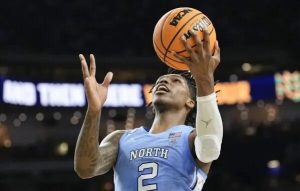CONFIRMED: The nation’s No. 1 college basketball prospect has officially committed to UNC. Here’s why I picked the Tar Heels over the Duke Blue Devils and other top programs…
In one of the most surprising developments of the 2025 NBA offseason, Austin Reaves, formerly a b
 eloved guard for the Los Angeles Lakers, has signed a three-year contract with their fiercest rivals—the Boston Celtics.
eloved guard for the Los Angeles Lakers, has signed a three-year contract with their fiercest rivals—the Boston Celtics.The announcement sent shockwaves across the league, sparking a mix of outrage and intrigue as fans tried to process the unthinkable: Reaves wearing Celtic green. For Reaves himself, the choice didn’t come lightly. Known for his tenacity and underdog story, he’d carved out a place in Lakers lore, rising from an undrafted rookie into a clutch performer and fan favorite. His poised playoff outings, crafty mid-range jumpers, and gritty mindset endeared him to L.A. supporters.
But when Boston came calling—not just with a lucrative offer but with a compelling vision—Reaves was ready to listen. “I’ve always respected the history here,” he explained at his introductory press conference, standing beside Celtics GM Brad Stevens and head coach Joe Mazzulla. “Leaving the team that first believed in me wasn’t easy. But I came here to win.”
Boston’s pitch extended beyond money. It was about opportunity and purpose. With Jrue Holiday transitioning to a defensive veteran role and Derrick White testing free agency, the Celtics had a clear opening in their starting lineup. Stevens was upfront: Reaves wasn’t coming to sit on the bench—he was coming to be a cornerstone. Joining forces with Jayson Tatum and Jaylen Brown, he completed a new Big Three defined by skill, toughness, and high IQ.
Skeptics were quick to question whether he’d truly fit in. “He’s a Laker through and through,” some pundits argued. “This is pure betrayal.” But as Celtics fans got used to the idea, they began to embrace him. “He’s got heart,” one supporter said. “And if you torch us for 25 points in the playoffs, I guess you earn respect.”

Training camp revealed a fired-up, evolved Reaves. He brought a hard-nosed attitude reminiscent of Celtics guards like Rajon Rondo and Avery Bradley, and he’d sharpened his skills—his movement off the ball was smarter, his three-pointer more consistent, his defense more physical. Inside the organization, the buzz grew: This guy is the real deal.
On opening night—against none other than the Lakers—the TD Garden atmosphere was electric. Boos rained down on LeBron James as chants of “Let’s Go Reaves!” erupted whenever Reaves had the ball. In the third quarter, with the game tight, he spun past D’Angelo Russell and buried a step-back jumper over Anthony Davis. The crowd went wild. Cameras caught Tatum smiling and mouthing, “He’s ours now.” Reaves finished with 27 points, 8 assists, and a +18 plus-minus, and Boston came away with the win.
By midseason, the Celtics sat atop the Eastern Conference standings, while Reaves posted career-best numbers. His connection with Jaylen Brown looked effortless, and Tatum credited him with easing the offensive load. By All-Star weekend, no one called him “the Laker who bailed.” He’d become “the Celtic who arrived.”
ESPN aired a feature titled Reaves: The Rival Who Switched Sides, tracing his transformation from Lakers hero to Celtics catalyst. Reflecting in a Players’ Tribune essay, Reaves wrote, “I heard all the criticism. But I didn’t sign here to make everyone happy. I came to compete.”
And compete he did. As the postseason approached, one narrative loomed largest: the possibility of a Celtics-Lakers Finals showdown. Reaves against his old team. Boston against the weight of history. The next chapter of the NBA’s greatest rivalry—starring an unexpected new face in green.



